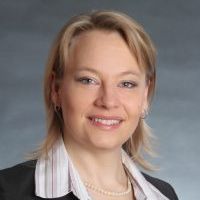Reisinger Group
Molecular Biology of Cochlear Neurotransmission
My research interest targets towards a better understanding of hearing, specifically of how sensory cells in the inner ear transmit information to the auditory nerve. With my group, I analyze proteins involved in synaptic transmission from auditory hair cells with molecular biology, protein biochemistry, fluorescence immunohistochemistry, viral transduction and cellular electrophysiology. The protein otoferlin is known to play a crucial role for a late step of vesicle exocytosis (Roux et al., Cell 2006) and is required for fast vesicle replenishment (Pangrsic et al., 2010; reviewed in Pangrsic, Reisinger and Moser 2012). To date, it is largely unknown how otoferlin triggers exocytosis or regulates vesicle replenishment. With my group I study the impact of pathogenic missense mutations in otoferlin on protein function, localization, and on exocytosis from hair cells (e.g., Strenzke et al., 2016). Together with my CRC collaboration partner Henning Urlaub at the Max-Planck-Institute for Biophysical Chemistry (link), we aim at identifying protein interaction partners of otoferlin by mass spectrometry. In addition to unraveling the biochemical and structural properties of otoferlin, we are interested in restoring hearing by genetic manipulation of auditory hair cells. For this, we transduce auditory hair cells of deaf mouse mutants with viruses (e.g. Reisinger et al., 2011) in vivo and in vitro and analyze rescue of function by patch-clamp recordings and auditory brainstem response recordings.
In 2018, Ellen Reisinger accepted a professorship at the University of Tübingen.

 https://orcid.org/0000-0003-3739-7569
https://orcid.org/0000-0003-3739-7569